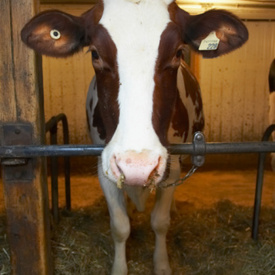06/29/2010 // West Palm Beach, FL, USA // Tara Monks // Tara Monks
Washington, DC – The U.S. Food and Drug Administration issued a press release on Monday, June 28, 2010, stating its intention to phase out the use of medically important antibiotics in food-producing animals. The organization stated goals of adopting regulations that would limit antibiotic use and require veterinary oversight when administered.
The press release states concern over the use of antimicrobial drugs in food-animals, such as chickens and cows. The agency stated, “The FDA acknowledges the efforts to date by various veterinary and animal producer organizations to institute guidelines for the judicious use of antimicrobial drugs, but the agency believes additional steps are needed.”
The press release also states, “The FDA recognizes the importance of antimicrobial drugs for addressing the health needs of animals….[but] The development of resistance to these drugs, and the resulting loss of their effectiveness, poses a serious public health threat.”
In other words, the FDA wants to see fewer antibiotics in animals raised for consumption on the basis that overexposure to the antibiotics increases human resistance to them.
The FDA has proposed to either change its rules to end antibiotic use as a growth promoter, or to allow companies to do so voluntarily.
USA Today reported the FDA will seek comments from the public and industry on the subject for 60 days. According to Joshua Sharfstein, the FDA’s principal deputy commissioner of food and drugs, the FDA will look towards the comments when considering its next move.
Steven Roach, a spokesman with Keep Antibiotics Working, a coalition of public health, consumer and animal welfare groups, expressed disappointment with the press release, telling USA Today, “they [the FDA] don’t have any description of what they plan on doing or how they plan on doing it.” Roach also expressed his sentiments on the meat industry, stating those who feed their livestock antibiotics to promote growth will be hard pressed to give up easy profits.
Groups such as Keep Antibiotics Working claim there is a growing body of solid scientific evidence proving antibiotic overuse in animal agriculture contributes to antimicrobial resistance transmitted to humans. Examples such as tetracycline and fluroquinolone use in chickens, and the subsequent human resistance to such antibodies are cited as examples of the correlation between animal use and human resistance.
According to the Union of Concerned Scientists, a nonprofit public health group, 70 percent of all antibiotics in the U.S. are used in healthy pigs, chickens and beef cattle. The group explains animals are given antibiotics because it allows them to grow faster on the same amount of feed, thus increasing profits.
The group also points out resistant bacterial infections in the US increase health care costs by $4 billion per year.
Furthermore, since antibiotics from the quinolone class became approved for animal use in 1995, levels of human resistance to the drugs have risen. For example, one in six cases of Campylobacter, the most common source of food poisoning, show resistance to the drugs historically used to treat the infection. A spread of quinolone-resistant strains of Salmonella DT105 has also been documented.
Meat producers undoubtedly dispute the claims on the dangers of antibiotic use in animals. As health advocates predicted, many industry professionals are lashing out at the FDA’s proposal. Sam Carney, president of the National Pork Producers Council, told USA Today the FDA “didn’t present any science on which to base this.”
Media Information:
Address:
Phone: (866) 598-1315
Url: http://TaraMonks.visionsmartnews.com/fda-proposes-limiting-antibiotic-use-in-food-producing-animals_1109.html







